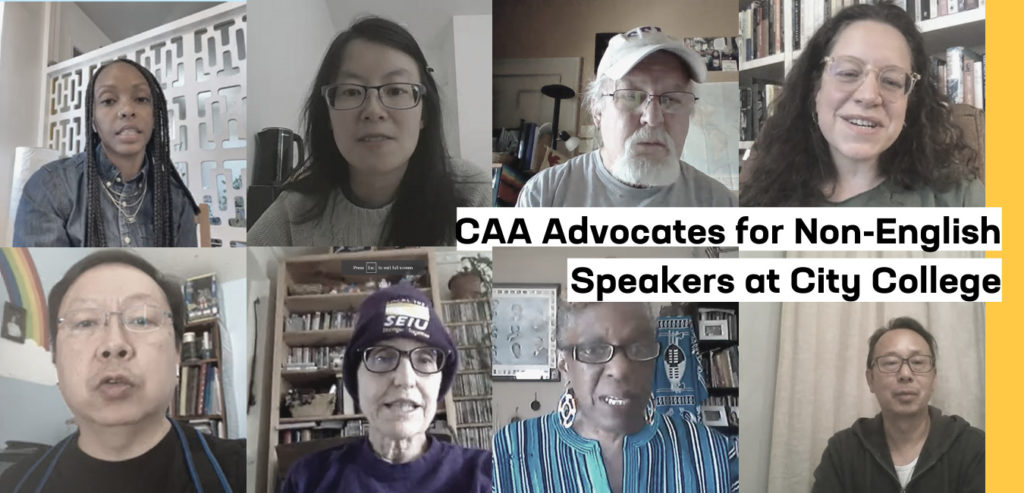
In an effort to address a $33 million budget deficit this year, City College of San Francisco (CCSF) approved budget cuts across 39 departments. Significant advocacy did ensure funding for the college’s key workforce development programs. However, they fall short of what is needed to sustain critical programs. Without significant support in the coming years, additional budget cuts are expected to have a huge impact on Limited-English Proficient (LEP) immigrants and other communities that benefit from community college education in the San Francisco Bay Area.
CAA has long advocated for education equity, and for keeping CCSF free and affordable for the immigrant communities we serve. We led a broad coalition of organizations and community members that successfully advocated for the permanent CCSF Chinatown campus that opened in 2012, which enabled tens of thousands of monolingual Chinese speakers to receive an education. Since then, we have collaborated with City College on multiple occasions to provide job training and language acquisition opportunities for Chinese immigrant communities. Among CAA’s LEP workforce clients, we have seen a 37.6% increase in enrollment at CCSF in 2020 in comparison to 2010.
In a statement protesting the budget cuts, CAA Economic Justice Program Manager Sally Chen said, “CCSF consistently provides pathways to economic stability for our clients. These cuts will hurt communities that already face barriers to employment. The Chinese immigrant workers that CAA serves rely heavily on CCSF for learning English, basic skills, and vocational training.”
Asian Americans account for 32% of the 60,000 students per year who are educated through CCSF and 50% of the English as a Second Language (ESL) program — CCSF’s largest department. The department also faces significant budget cuts. The most recent round of proposals included a 52% reduction in the ESL program, which would make it harder for 15,000 students — the number of individuals taking ESL classes in Spring 2020 — to improve their language skills.
Non-English language classes, which are critical in responding to growing demands for multilingual workers, are also impacted. Some classes — for example, the Cantonese program, first established in the 1960s — were slated for cancellation. Although student organizers convinced administrators to offer a few sections of Cantonese in Fall 2021, CAA remains concerned about the longevity of the program, which has taught generations of community organizers and interpreters.
According to CAA Economic Justice Advocate Amos Lim, “In a city where nearly 20% of residents have limited English proficiency, our workforce needs to be able to communicate with the community-members they serve. Cutting back free and affordable language programs would represent a giant step backward for language access in San Francisco.”
In partnership with AFT2121, the Chinese Progressive Association, and Supervisor Gordan Mar, CAA is fighting to preserve CCSF programs. In a policy memo circulated to the San Francisco Board of Supervisors’ Youth, Young Adult, and Families Committee, CAA laid out several recommendations to mitigate the impact of budget cuts on LEP communities:
- CCSF should fully fund and preserve programs that serve LEP communities, including ESL classes, vocational ESL pathways, and language classes for service providers.
- CCSF should streamline student registration to address access barriers for LEP students.
- The San Francisco Board of Supervisors and Mayor’s Office should partner with CCSF on expanding the Workforce Education and Recovery Fund.
- The San Francisco Board of Supervisors should lead a convening of local stakeholders and State legislators to begin to address CCSF’s long-term sustainability as well as the College’s connection with relevant funding streams.
The San Francisco Board of Supervisors did sign off on a $1 million expansion of the Workforce Education and Recovery Fund, which represents a big step forward in supporting workforce training programs for San Francisco residents. More investment is needed, however, and CAA will continue to work with our partner organizations to facilitate access to affordable education in San Francisco.
You can show your support by participating in this student-led CCSF poster project and sharing your favorite City College landmarks here: https://bit.ly/CityintheCity



